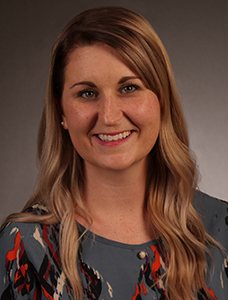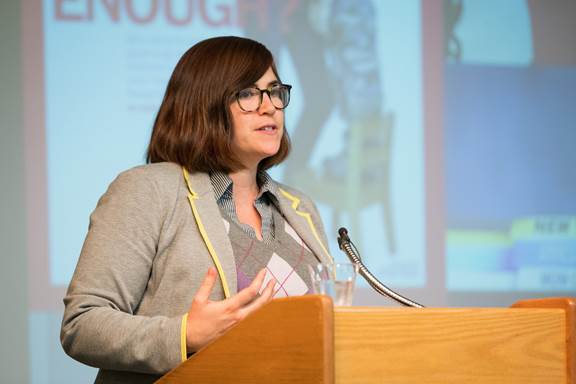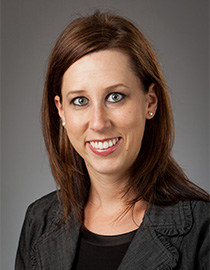Research Spotlight on Women Faculty: Amber McCord, Emily Skidmore, and Laura Cardella
March 26, 2020 |
During March, Texas Tech is celebrating women faculty who exemplify excellence in research, scholarship, creative activity, teaching, and mentoring.
Amber McCord
Assistant Professor of Practice; Department of Professional Communication

McCord teaches courses related to digital media and design, whiling serving as a graphic designer for the Office of Research Development and Communications (ORDC) and the Communication Training Center (CTC). Her research investigates the intersection between consumer behavior and persuasive message characteristics in the context of environmental and agricultural issues.
What inspired you to work in your field/area of expertise?
Three individuals really stand out in my mind. Dr. Courtney Meyers, Dr. David Doerfert, and Dr. Todd Chambers inspired and encouraged me to pursue a career in academia. Dr. Meyers was my thesis and faculty advisor during my master's program. She not only guided me through the research process, she was an excellent teacher. I served as her teaching assistant for a web design class, which is where I first considered being a professor. The way she provided a balance between structure and encouragement in the classroom was inspirational. As a TA, I would work with students to develop their own personal websites. Seeing the accomplishment and satisfaction the students felt sparked my interest. However, I don't think I would have pursued this career without further encouragement. Meyers, Doerfert and Chambers saw something in me that I didn't see in myself. They were the ones that told me to consider a doctoral program and have continued to be a support system for me as I navigate professor life. I wouldn't be where I am without them.
Who inspired you to pursue academia?
I was first inspired to research during my freshman year in high school. I participated in the National FFA Science Fair. I was always curious, but the science fair gave me an opportunity to test and conduct research about my questions. What I loved even more than finding answers, was communicating the results to the local farm bureau. Now, most of my research investigates ways to improve communication surrounding agricultural issues. It is my way of combining an industry I'm passionate about with a skillset that is fundamental to societal progress.
What would you tell your female students interested in pursuing an academic career?
I would tell my female students the same thing I would tell my male students if they
were interested in pursuing an academic career – it ain't easy. I think it is important
to set a realistic tone for students who are interested. You will get rejected, you
will be challenged, and you will get tired. Of course, I would follow that up with
how rewarding it can be when a student thanks you for being a light in the classroom,
or when a manuscript that you have worked on for years finally gets published.
Emily Skidmore
Associate Professor; Director of Graduate Studies; Department of History
 Skidmore's research interests are U.S. women's and gender history, cultural history,
and queer studies. Her book, True Sex: The Lives of Trans Men at the Turn of the Twentieth
Century, was published by NYU Press in the fall of 2017. She is also an Associate
Editor of Gale's forthcoming text, A Global Encyclopedia of Lesbian, Gay, Bisexual,
Transgender and Queer History
Skidmore's research interests are U.S. women's and gender history, cultural history,
and queer studies. Her book, True Sex: The Lives of Trans Men at the Turn of the Twentieth
Century, was published by NYU Press in the fall of 2017. She is also an Associate
Editor of Gale's forthcoming text, A Global Encyclopedia of Lesbian, Gay, Bisexual,
Transgender and Queer History
What inspired you to work in your field/area of expertise?
I was inspired to study (and eventually teach) History because of the courses I took as an undergraduate at Macalester College. It was there I learned that History is political--i.e. the stories that we tell about our past influences who we see as having a right to power, as being important, or, in the case of U.S. History, who has the strongest claim to being "American." It was at Macalester that I began to see how impactful it is to tell U.S. History with women, people of color, immigrants, and/or queer people at the center of the narrative rather than at the margins, and it was there I decided that is what I wanted to pursue in my own career.
Who inspired you to pursue academia?
I've been lucky to have encountered a number of incredible mentors throughout my education. My first advisor, Peter Rachleff, powerfully illustrated to me what it means to be scholar activist (and he is someone I continue to be inspired by; after retiring from Macalester, he and his partner opened the incredible East Side Freedom Library in St. Paul, Minnesota--if you are ever in the Twin Cities, check it out!). In graduate school, I was deeply inspired by Antoinette Burton, one of the co-advisors of my dissertation. My first year of graduate school was rough, and I considered dropping out--until I met Antoinette. She was (and continues to be to this day) everything one could want in an advisor: tough, caring, diligent, witty, and smart as a whip. She always asked precisely the right questions, and bolstered me up when I was doubting myself. I'm constantly striving to emulate her model of feminist mentorship with my own students now.
What would you tell your female students interested in pursuing an academic career?
I tell all my students (but especially my female and non-binary students, and my students of color) to pursue their passions, even if it calls them into spaces where there are not many others that look like them. This is vital because women and other historically marginalized groups enrich the academy by bringing with them important perspectives and ideas that make every room they are in better.
At the same time, I also try to be honest: this career path can be tough for women and other historically marginalized groups, and so its important to study with career diversity in mind. The academic job market is changing rapidly so train yourself broadly, as its challenging to know what skill-sets will be most marketable upon graduation.

Laura Cardella
Assistant Professor of Practice; Area of Finance
 Cardella's areas of expertise include corporate finance and market microstructure.
Cardella's areas of expertise include corporate finance and market microstructure.
What inspired you to work in your field/area of expertise?
I chose to study finance because it offers a systematic method to identify value creation and value destruction. We can use the tools of finance to make decisions about future investments, projects, and capital allocations. Recently, I have focused on information flow and the role of technology in financial markets, which is important as we move forward in the age of automation.
Who inspired you to pursue academia?
I can attribute my pursuit in academia to endless encouragement from my Dad and a conversation with Dr. Antonio Camera, who demonstrated incredible enthusiasm for financial theory and its applications.
What would you tell your female students interested in pursuing an academic career?
You have to run your own race.
Office of Research & Innovation
-
Address
Texas Tech University, 2500 Broadway, Box 41075 Lubbock, TX 79409 -
Phone
806.742.3905 -
Email
vpr.communications@ttu.edu
